An obssesive, overly detailed and bizarre blog about Rosencrantz and Guildenstern (and whatever I reblog)
Don't wanna be here? Send us removal request.
Text
Spading the Souffle (part 3)
One of the great pleasures of discovering the Rosencrantz and Guildenstern section of AO3 is how others who write in the Rosencrantz and Guildenstern fandom are unafraid of digging down into the material. Even when, for their own reasons, authors reconfigure Rosencrantz and Guildenstern’s personalities - its clearly a response to the text.
You kind of have to be willing to write meta to write in the Rosencrantz and Guildenstern fandom. You have to be wiling to grapple with the text and the text itself encourages one to question it
.The rhythms and beats of the text are best known if you see the play performed (the movie is fine) and there’s an odd reassurance in knowing that it was originally a one act in iambic pentameter called “Rosencrantz and Guildenstern Meet King Lear”. I once became obsessed with reading this version and hunted down a potential copy in a collection of Stoppard’s papers in Texas. I live directly next to Texas and had actual plans to go visit this collection but at the time the collection was removed from public view due to some personal papers and I never followed through.
Now I’m going to change subjects to PG Wodehouse.
When I say Wodehouse fandom here, I’m not referring to the Writing Fandom. I’m referring to the basic fans. I’m unfamiliar with the basic attitude in the Writing Fandom as I’m not a member of any writing groups (unfortunately the commenter I mentioned previously is a member of every Wodehouse writing group I’m aware of and while I do believe this person was responding to something real, I don’t want to be vulnerable around this person).
There’s a strange reluctance in the Wodehouse fandom to grapple with the text beyond enjoying it. I half-understand it, I suppose. But it feels like people discourage analysis of the text as if one were suggesting digging the man himself up.
I periodically figure out a few “rules” of Wodehouse - but I’m an asshole who doesn’t write things down so I forget. I forgot the name of the story I’m currently writing two or three times before I tearfully begged for access to the computer and finally changed the name on AO3.
I enjoy finding those things. I guess it somewhat deters from the bubbly light as air lack of effort FEEL of the story and I guess it might ruin the enjoyment of the story for some people.But, even though we all enjoy Wodehouse, we don’t necessarily all enjoy the same things.
I’ve been listening to Luck of the Bodkins while walking my dog and its an excellent example of the sort of clarity I admire in Wodehouse. Its hard to find a story that doesn’t have that beautiful clarity, but since I’ve been listening to Luck, that’s the one I’m thinking about.
I love the Hollywood magnate (since I’ve only heard the name I forget it), because he’s both a stereotype and very specific. That’s the first rule of Wodehouse, btw.
His motivations, goals, fears are all excellently and clearly laid out.
Right now one of my favorite moments in Wodehouse is the scene where the porter (I feel like they used a word other than porter but auditory processing issue) is trying to impress the Hollywood magnate by vividly describing what might happen if a man were to be held by customs.
Its a beautiful character driven moment that is most impressive in its reserve.
The humor of the moment ENTIRELY derives from the reader understanding that Hollywood magnate is imagining HIMSELF as the man held by customs. I laughed out loud multiple times.
A lesser writer would have given into the urge to goose the scene up a bit. There are no interruptions to describe the magnate’s reaction, because Wodehouse had made that character so crystal clear that nothing needed to be added. I never cease to be amazed by the pure craftsmanship of Wodehouse.
I have a story I’ve been working on for a month and I’m about to start it for the third time. I’ve been debating whether or not I’m ACTUALLY going to start it for the third time or let this story idea die off. I’m 90% sure I’m going to follow through now because the title I’d decided on is actually a phrase used in Luck of the Bodkins. I'm hoping that will work like a cheat code and bypass my other stuff and make it so I can write again.
2 notes
·
View notes
Text
OT: Clarity (part 2 of me and writing)
One of the things I loved about Rosencrantz and Guildenstern are Dead was how comfortable the Play is with being unclear. Of course, most of this is that Stoppard is a master of stagecraft and somehow, when done on stage it all makes sense. Or feels like it makes sense in the universe we’re seeing. When done onstage WELL, we’ll say.
Its this veneer of quality and professionalism that keeps things that seem chaotic enjoyable instead of “oh no this fellow doesn’t know what he’s doing...”
To contrast, PG Wodehouse’s stories are strikingly clear.
I periodically get kind of obsessed with haunted houses. I can’t go in them - I have too strong of a startle reflex and a sharp shrill scream that attracts attention. But I love reading about them and reading descriptions of them. It feels chaotic in a haunted house buts its very controlled.
Rosencrantz and Guildenstern are Dead is a haunted house you’re familiar with - and you’re there with two people who both are taking the haunted house way too seriously and also periodically forgetting that they are in a haunted house. You enjoy the haunted house, of course, but you primarily are enjoying watching your friends freak out. Occasionally a werewolf comes out and scares one of them if you take too long in a room. Its a good time but their literal conviction they are going to die when a light flashes and the sound of a truck plays is both hilarious and a little sad
With PG Wodehouse you are behind a one way mirror in a haunted house. You clearly see how the house works and can fully appreciate how goofy people look when they are freaking out over cardboard, flashlights and sound effects because you can see its very safe and everyone will be ok. The guy in the werewolf costume has perfect timing for moving people on to the next room. He is named Sid and you’ll have coffee with him at IHOP after his shift.
I’m sure there’s a proper word for the quality I’m trying to describe, but I’m not sure if this makes sense out of my head. Clarity isn’t the word, but clarity is what makes the haunted house safe.
I know I struggle with clarity in my writing. I’m sure that the teacher I mentioned in my previous post was responding to something very real. I phrase things oddly. I do this when speaking as well.
An example: I wrote a story that takes place in a boys school that is famous for being a boys school. If you were to ask someone what, if anything, they knew about this school they’d say ‘Its a boy’s school’. I wrote almost all male characters - with the only female character clearly visiting. I mention, by name, a DIFFERENT school that I call a girl’s school. I researched this school for almost a year before I began writing this story. I bought books about it. I don’t fuck around with my fan fic because I have crippling life altering writing anxiety.
The first comment I got, within an couple of hours of posting it, was a suggestion I do a basic google search about the very general subject of upper class English schools. When I later contacted this person for clarity, they explained they thought I hadn’t written this famous boys school as a boys school. I’ve reread the original thing I wrote dozens of times. I don’t understand at all how anyone would get that impression, much less get the impression I’d done so little research that I needed to do a basic google search on the subject.
I struggle with clarity.
Unfortunately I haven’t known anyone I’ve trusted to actually verbalize how I’m being unclear. When I wrote for Yearbook, that teacher would often rewrite my sentences and when she did that I’d go “OH, I see. I get it now.” But even though we’re all using the same words and rules, sometimes these things are subtle. I’m pretty quick on the uptake when I’m taught directly. I paid strict attention in English class. I’m one of those weirdos who genuinely enjoyed learning about grammar. Apparently its something more subtle than grammar errors.
Working on this for the last year or so, I’ve been focusing on the two clearest writers I know: PG Wodehouse and Agatha Christie.
I’ve been listening to them on audiobook because I am an easy reader and get sucked into the worlds of these authors so easily that I miss the structural things one wants to look for as a writer. Since I have an auditory processing disorder, I have to focus in a different way to listen to audiobooks which is oddly helpful towards this end.
I’ve been repeatedly struck by Wodehouse’s clarity in writing since I’ve begun studying him, but the example that springs to mind is the opening to Pigs Have Wings.
I listened to Pigs Have Wings with only the vaguest knowledge of the Blandings series. Basically I knew it involved pigs and impostor stories.
Within 5 minutes - probably not even a full front and back of a page - an incredible amount of information is conveyed so enjoyably that you don’t even consciously realize you’re getting exposition. Its like an expert nurse injecting information directly into your brain.
In five minutes I know who Lord Emsworth is, his goals/motivations. I know Constance and her goals/motivations. I know their relationship to each other both personal and interpersonal. I know the names of every person staying in the house and how Lord Emsworth and Lady Constance feel about them. I also get information the household’s relationships to each other and an idea of what their goals/motivations might be.
Its an amazing piece of writing and it goes down so smoothly that if I were reading it I would have been halfway through before it occurred to me ‘Why do I feel like I know these characters better than real life people I’ve known for decades?”
Clarity seems to be a skill and a skill one can learn. I’ve noticed that most quality older genre work is often strikingly clear
I’ve had 2 stories die on me since the year began. A third never got beyond a vague concept.
I’ve been working on a fourth for over a month now. Rewrote the opening twice before I realized I was writing from the wrong perspective and have been trying to rewrite it a third time.
I sit down to write and my brain tells me that I can’t even write a famous boys school that is commonly known as a boys school in a manner that is recognizable as a boys school even when its incredibly, unbelievably obvious to me and I’ve done a ridiculous amount of background work. That I will never write anything anyone else will understand.
Its as if I had gone through a local haunted house only to discover a creature that looked just like something I’d seen in my nightmares for years made from a repainted Spirit of Halloween animatronic with dollar tree glow sticks attached and had a huge panic attack. Sid took off his werewolf mask and discreetly escorted me out but I knew. And Sid knew. And you can’t go back to the haunted house without seeing Sid.
I know, intellectually, the only way to define my clarity in writing is to write and get experience in communicating effectively. But I’m incapable of seeing clear and not clear in my own writing, I don’t have anyone I trust to read my work and give actual helpful feedback and for some weird reason I can only physically write the stories I think of if I am actively planning to publish them online.
I’ve read writing books by the dozen. That’s what I did during the ten years I didn’t write, oddly enough.
0 notes
Text
OT: Me and writing (part one of several, probably)
To keep this somewhat on-topic, I’m going to write about my history of Rosencrantz/Guildenstern fan fic first.
I started writing fan fic almost the night I first saw the Play performed. Mostly stuff written in school notebooks, notes in my diary.
I was aware of fan fic online. Very aware. In fact the majority of my time online was spent looking for Rosencantz/Guildenstern fan fic and inevitably only finding other people looking for it. There was a Star Trek fic that was fun - last time I looked it was still online somewhere and I bet I could find it again.
Anyway I was writing only personal fan fic (and not writing in the physical sense only head fic) for at least 4, maybe 5 years before I wrote my first actual fan fic. I kept it short and bland and I still shook for days after I published it, convinced people were going to leave me all caps comments that I should do a basic Google search about Rosencrantz and Guildenstern.
I’d love to say after I was reassured no one really cared, I started writing assiduously, but that would be a lie. I still wrote i my head fics and searched for other people who wrote Rosencrantz/Guildenstern fics.
I did finally find a community. Reading other fics helped me in the way I hoped seeing other fics in my fandom would help me. I never really did connect with anyone specific and I ended up quitting writing for almost ten years because my anxiety around writing was so intense it affected my day to day life too much. (tried meds, don’t want to get into it)
At one point I had a teacher who had given us a writing assignment that we would have to re-write until the teacher considered it “perfect”. It was either an A or an F. I no longer remember what I was writing about or which teacher it was or even how old I was. It feels like an elementary school memory.
I thought it sounded like a fun idea. I looked forward to getting firm and fair criticism of my writing. I loved reading. I wanted to be a writer but I was still at the age where people would nod and say “That’s very good.” and it was clear they’d say that no matter what.
I probably was a little sloppy in my first draft because I knew I’d be getting feedback. In my mind, getting that first draft review was part of the what she wanted from us.
I got back a “read it again” note and I wrote a better version.
I got back a note that I needed to work on clarity. I don’t remember if that was the phrasing, but that was the meaning.
I did another draft, recognizing errors I made and tightening up sloppiness and convinced THIS was the draft.
I got it back “read it again.” I did. I read it over and over. It looked perfect.
I went to the teacher asking for specifics - something I always resisted doing. I was NOT the kid who tried to get the teacher to help me with every little thing. She told me to read it again and I’d see it.
I did
I started changing random things because I couldn’t figure it out. My paper seemed perfectly within the guidelines requested. Everything seemed clear and laid out well.
She wouldn’t get more specific than I needed to be clearer and seemed convinced that if I read it closely I’d get it.
The teacher started acting like I was just not wanting to do the work when I sat around reading this essay OVER AND OVER trying to figure out what she thought was unclear. I literally broke it down word by word until it was like one of those exercises where you don’t use pronouns and everything I wrote felt like pure nonsense to me.
She finally accepted my assignment. I don’t know if I actually did what she wanted or she accepted I genuinely didn’t understand what the problem was. But I didn’t feel taught. I felt beaten and punished.
It’s been difficult for me to take any vagueness about my writing since then. At that age, I was always “starting my novel” and then not really following through because I was elementary school aged. This incident was when I stopped putting my thoughts where other people could see them.
0 notes
Link
I still haven’t finished this game - more due to not being allowed time on the computer that it works on rather than it being difficult or boring. In fact I was very close to finishing it, I think, I just hope I can remember what I I was doing.
Anyway if you are following me for some reason, you probably want this game. It has a lesbian couple Rosencrantz and Guildenstern - and they are ADORABLE.
When I played, I spent an inordinate amount of time interacting with and following them and they are a DELIGHT.
Guildenstern is the ditz in this version, but in a very Guildenstern way. There is actually a moment where she worries about not having a first name. Beautiful.
0 notes
Link
The more I see of this the more I worry that somehow I created this with pure will as a 16 year old like some sort of theatrical tulpa.
1 note
·
View note
Link
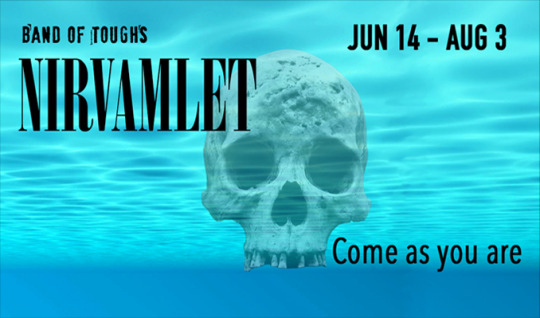
Nirvamlet takes over the Arts Complex!
Band of Toughs puts a 90s grunge spin on Shakespeare’s Hamlet in a rocktail of icons and heart-shaped depression, with a splash of conspiracy and murder. The audience is part of the action, traveling with the fated rockstars through corridors and vinyl graveyards--all with tasty beer and live music. Boulder Fringe Audience Choice Award Winner. As part of Next Stage NOW, the Band of Toughs transform sections of the Arts Complex into a present-day Elsinore castle. Tickets at axs.com.
Performance Dates: June 14, 21, 28 July 11, 18, 25 August 1, 2, 3
0 notes
Text
Tom Stoppard provides no stage directions other than the main

I HAVE ACTUALLY SEEN THIS BIT DONE A COUPLE OF DIFFERENT WAYS. And they are all supported by the limited stage directions and context of the following scene.
The first way I’ve seen this done is that Rosencrantz is responding to Guildenstern’s call to him as a call to interact with Hamlet.
Guildenstern goes and mimes an attempt to interact with Hamlet before returning to Rosencrantz without Hamlet noticing him at all.
The victory smiles are from misplaced confidence.
The next lines where they congratulate each other are a mix of irony, reassurance and some misplaced confidence. The “catch me unawares” talk is the beginning of the playacting section that comes next.
I’m not super into the name thing so I really like this interpretation. In my personal opinion, most people make too much of the “they get their names mixed up” thing.
I think in performance it could work with either Rosencrantz or Guildenstern being the one to try to “talk” to Hamlet with tones and line readings adjusted to match.
The second way I’ve seen it done is generally the more accepted way according to my theory books and the other performances I’ve seen.
In this version, Guildenstern sees Hamlet, tries to get Rosencrantz’s attention to him and the “triumph smiles” are reacting to the fact that Guildenstern chose a name for Rosencrantz and Rosencrantz responded immediately to the name as his.
The following sections are an attempt to prove that Guildenstern would ALSO react instinctively to the proper name.

I love these little codas. My favorite productions tend to use this as a sort of call and response between them - I’m always a little disappointed when they’re cut.
I wonder if the daily week is a reference to the fact that Hamlet takes place over an ambiguous amount of time. They could be sitting around for a few hours, a day, a week a few months... I’m pretty sure there’s a clear statement of time passing the play scene (in Hamlet, that is).
But technically they are both asking for impossible things that are also sort of right? Because theatre has made them immortal and theatre has also made a week a day.
1 note
·
View note
Text
1967 version of Rosencrantz and Guildenstern are Dead
I’m not going to do too much compare and contrast until we’re more to the last act, because those are the most extreme changes - and the ones that are more disappointing vs “I can see why he cut that”.
My understanding of how published scripts work is that each edition is a reflection of a specific performance script. So generally different editions tend to be different because things get changed - some lines don’t work on stage, sometimes you don’t realize how an audience will react to something. The 1967 Faber edition is different from the Samuel French edition which is different from the standard edition you’ll find in most bookstores.
Tom Stoppard is a famous fiddler. He is CONSTANTLY changing lines - so its not surprising that the differences between the different editions would sometimes be a bit extreme. Tim Roth and Gary Oldman talked about how much he changed the script. I had a published version of the movie script that was pretty different from the movie. He was on set on the Daniel Radcliffe version and still making changes (I remember noticing a few fun ones but unfortunately I didn’t record them at the time).
However the Faber edition is the only one that has this ending - which is actually way more exciting in its implications than the little excerpt I posted the other day showed.

This is a silly joke and nothing was lost by cutting it.
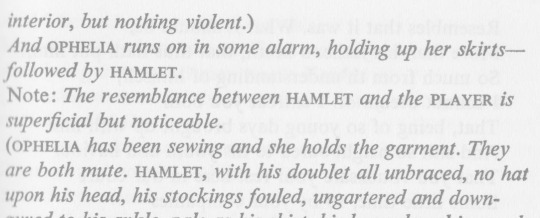
Was this in a different version? Maybe I’m getting mixed up.
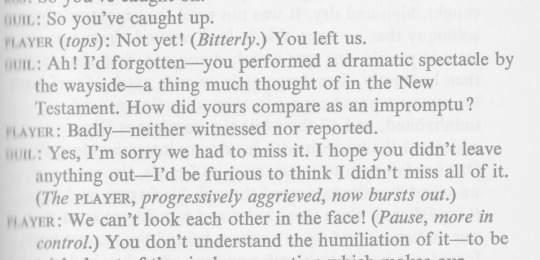
Now we’re getting good. This is the only reference to religion Guildenstern makes in any version of the play that I’ve seen. I tend to write Guildenstern as atheist, though I’ve written romantic Catholic Guildenstern in the deep past (more attracted to the ritual and beauty and the taboo factor in a Protestant society).
I wonder if removing references to religion from Guildenstern’s mouth was a conscious choice. This really isn’t worth the reference made - its kind of superfluous that’s not deliciously extra the way the “nightingale at a Roman feast comment” is.
He’s kind of needling the Player here in a way he doesn’t in other versions. Like damn son, he just offered some sex he didn’t do anything to you... yet....

If you’re going to threaten to step on my head you better wear those slick ass boots to do it.
Here’s that weird aggression towards the Player again.
I think cutting these things was a good choice. Some of that weird aggression remains in the final version but I bet this didn’t make sense in performance the same way and it probably makes the Player more sympathetic later in a way Stoppard didn’t intend.
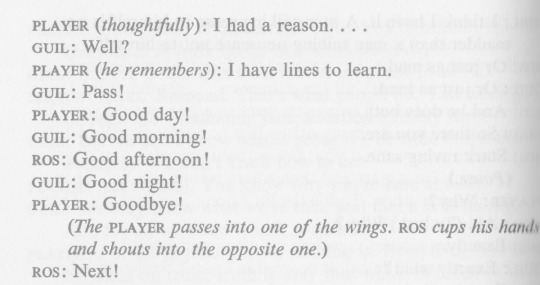
Firstly the Player should not be forgetful. That’s not his thing.
Secondly, this is a lame bit - its better gone. I get what he was going for and its a fun idea but yeah....

Meh minor change but thought I’d note it.
(starts on prev page with)
ROS (thoughtfully): Madness, then.
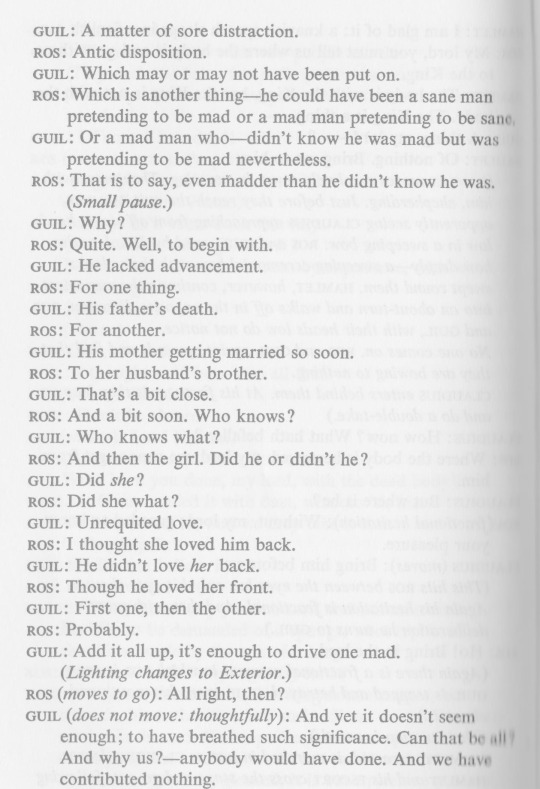
Yeah this was better cut. Though the madness talk at the beginning is fun, but also too insightful, unless Stoppard is implying they did figure out Hamlets hawk and handsaw comments (wait was this in this version? - it is).
And there’s the weird sexual implications in their talk about Ophelia.
Did she?
What do they care? They barely saw her. That’s Hamlet criticism talk and removing it was a total smart move.
The “loved her back” “loved her front” stuff made me say “gross” out loud when I first read it, but I have a really dirty mind. Its fun wordplay but I can’t even figure out what Rosencrantz is trying to say by “Though he loved her front” - like Hamlet thought she was pretty?
It gets incomprehensible pretty quickly. I’d hope that it played better in performance but since it got cut I bet it didn’t.
Its fun to see this bit, though.

I like the little “Why can’t you be still?” to Rosencrantz. That’s so adorably mother hen.
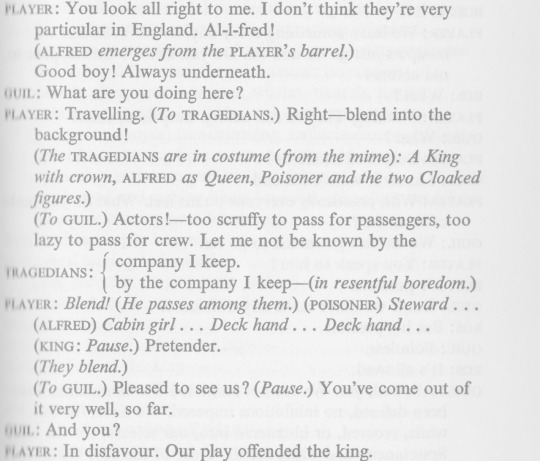
Ok first...
Let’s compare.

(Finishes with stage direction stating they “blend”)
Secondly....
I like that “Always underneath.” joke, ok? I think the Player needed more moments like that in the final version.
I don’t know why, but I do. I get why it was removed. It probably didn’t play well - especially as in a lot of the pictures of the early versions show Alfred being played by a literal child. I mean there’s really no reason to underline that at this point. So ok, it was pulled.
But why did he pull that wonderful actor talk in the middle? And that delightfully surreal moment where they all chant “company I keep)??? WHY???
Did some actor get all offended? Did it just really not play as well on stage as I imagine it playing? Because in my mind that moment is awesome. And then the Player assigns roles BECAUSE OF COURSE HE DOES. JESUS CHRIST WHY IS THIS NOT IN THE FINAL VERSION?
Oh and I consider the chant thing a point in my argument that the tragedians are a supernatural hive mind.
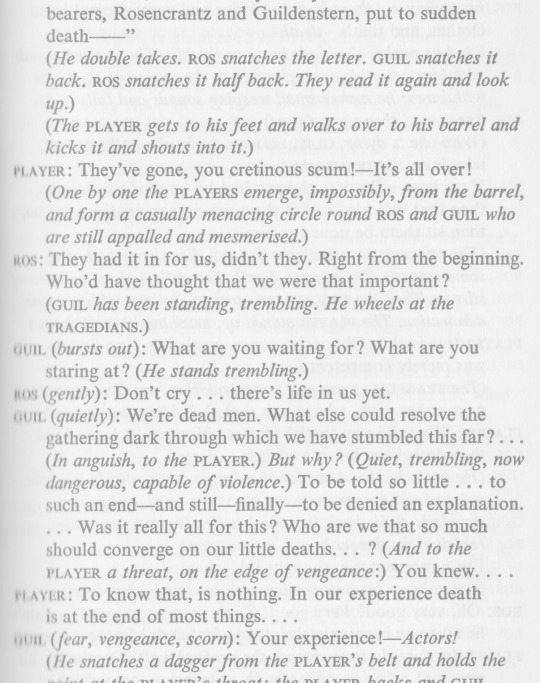
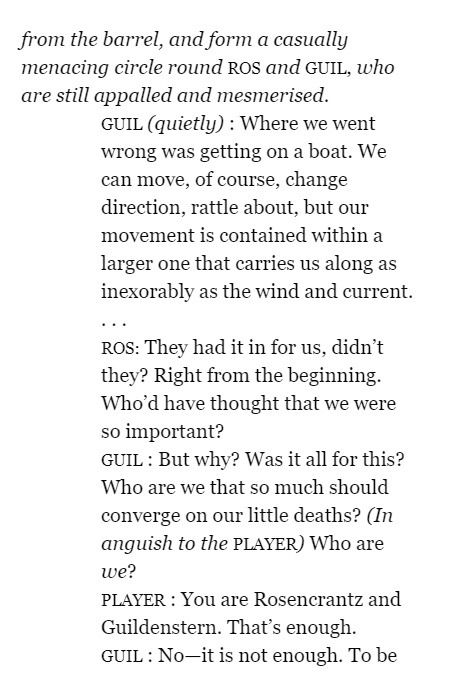
Here it gets different enough that its difficult to do a step by step comparison without just scanning the rest of the play.
Stoppard REALLY reworked this part heavily and I haven’t seen anything that explores why (its been a few years since I’ve tried to find information like this so its possible something has come out since then).
So I guess I’ll be the one to explore why.
Supposedly the way Stoppard first wrote the play was this:
He wrote Rosencrantz and Guildenstern meet King Lear - this is in iambic pentameter and I have not found any published version of it. Supposedly a draft of it was in a collection of his personal papers at a University in Houston. I actually once seriously attempted to travel to Houston to see if I could find this early draft but it never worked out.
It wasn’t good, by any account. Basically Rosencrantz and Guildenstern meet an insane King Lear.
From there, Stoppard started backing up and wrote about the boat ride to England and in the end he essentially wrote the play backwards (this is my understanding).
If you think of it from the writing perspective - that makes the major changes to the ending make more sense. The final version is cleaner. I think in the 1967 version he’s allowing thoughts an meanderings that were definitely important to the character but not necessarily needed by the audience. I bet it must have been a little muddied in performance for him to change it so much.
But ok
OK
OK
I totally screamed the first time I read Guildenstern say “You knew.”
I felt SO VALIDATED IN THAT MOMENT.
I get why it was removed and changed to a more helpless existential anxiety.
BUT DAMN STRAIGHT GUILDENSTERN. HE KNEW.
Its even better if that’s pointed towards the audience. I’ve seen that played before. Its fun.

Ok - my favorite version of the Player is officially the 1967 Faber edition. Man, he cut so much of third act Player’s personality. I bet he showed that shit to Richard Dreyfus.
“Show them the difference between an old ham like me and instinctive genius”
HE FUCKING CUT ALL OF THE PLAYERS BEST LINES OUT OF THE THIRD ACT? WHY?????
I suppose its worth noting the boat talk was moved up in the final version to directly after the Letter. That’s an interesting change. I can see, based on the difference in how it came out in the end why he would make those choices. “Where we went wrong” Guildenstern is going to be a calmer Guildenstern. Like going to the heights of “You knew” Guildenstern every night after spending hours on stage is a recipe for someone getting hurt.
At least he kept the beautiful statement on the nothingness of death.
One last thing on the original ending:
That “Are you coming?” KILLS ME.
Because Rosencrantz is leaving to die.
“Ok lets go. Come on.”
And Guildenstern is like “Why can’t you be still?”
I guess by 1968 Rosencrantz figured out it was best to leave without giving Guildenstern a chance to argue.
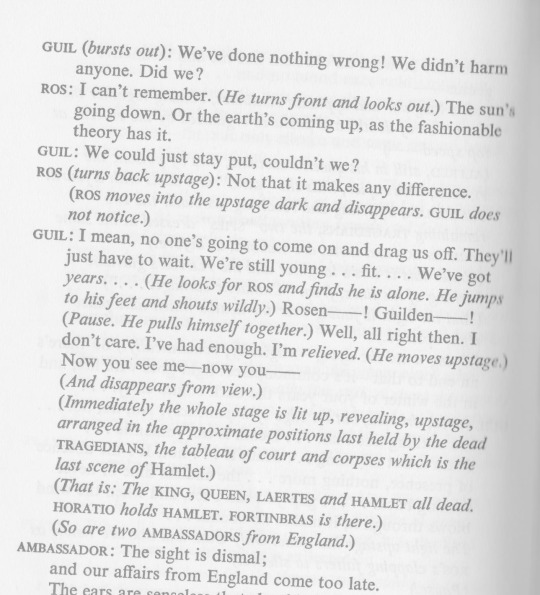
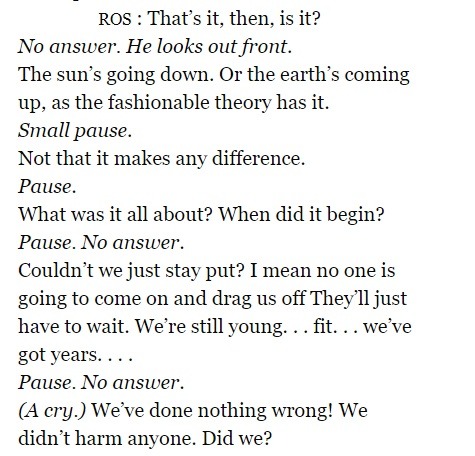
I find it very interesting that most of Guildenstern’s dialogue is moved to Rosencrantz in the later version and that Rosencrantz leaves much earlier and on such a line! OMG.
I love the common ending. But I will not deny that Rosencrantz disappearing on “Not that it makes much difference.” is fucking AMAZING.
Ok so I don’t know why he switched this shit around. Maybe he felt like the end was too Guildenstern heavy and Rosencrantz needed a few moments. It kind of was and he kind of did so good call on that.
But the original ending is still fucking AMAZIING.
AND
IT
ISN’T
DONE
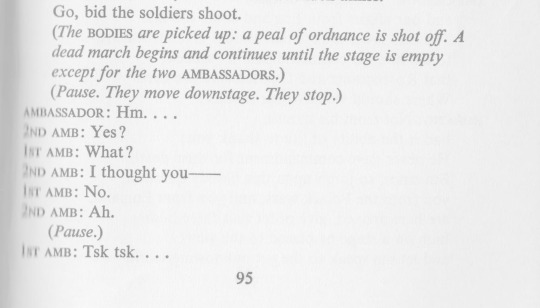
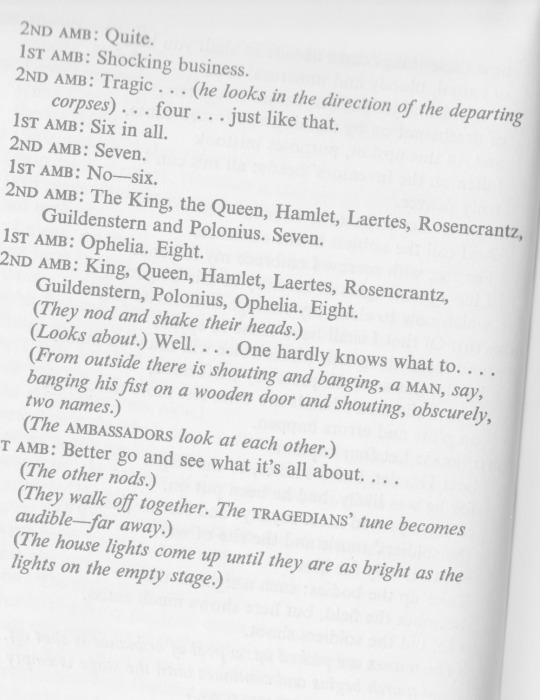
YES.
I didn’t go into this in my original post - but Rosencrantz and Guildenstern are Dead originally had a circular ending.
The Tragedians are a supernatural hive mind eating random Elizabethans. Change my mind.
But seriously, I get why Stoppard decided to remove this. Removing this is probably why he can reread this play and go “not bad” instead of cringing. But this ending is so great.
And that is my thesis as to why any Rosencrantz and Guildenstern are Dead fan should own the 1967 edition if they can find one (you can find them surprisingly cheap if you keep your head on a swivel)
2 notes
·
View notes
Text
Post-Questions game and some blog business
It occurred to me just now that I forgot to point out the character importance of the fact that Guildenstern lost the two times he didn’t cheat because he couldn’t resist the urge to, reach for rhetoric or take the actual words they were saying too seriously.
It secondly occurred to me that I probably haven’t explained how I’m doing this for a while. Basically, for each post, I’m looking at a flat two page on Kindle and either reviewing the two page for bits of interest to mention for fandom purposes or remembering interesting performance information. If there’s something that seems worth exploring as one section (like the Question game) I do that.
I’ve seen this play performed a LOT. Around the time I was doing this blog I had recently traveled twice to see Rosencrantz and Guildenstern are Dead/Hamlet cross productions and around the time I stopped I traveled a third time. At that point Rosencrantz and Guildenstern are Dead was no longer my special interest and I needed a break from it (think of it kind of like taking a break from an ex for a while before becoming friends).
I’ve been meaning to finish this up for a while now and I’m experiencing fandom stress from my new fandom being more populated than I’m used to (as in, I’m not used to my fandom having anyone else in it) so I decided to return to finish this as a de-stress mechanism. I certainly don’t mind finally having followers (when I stopped previously I didn’t), but I’m not going to be super social and I don’t know how much that’s expected on tumblr.
Anyway the actual section I’m doing is going to be under the cut.

The lines after this cuts off are
“What’s the game?”
Guil: What are the rules?
In English class our teacher pointed out the number of times the characters “round” on each other and the many references to gears within gears and such.
I suppose I probably should have done this in the Questions section because this is clearly an extension of the same scene before we change gears in the next section (which I’m a little excited to do because I have a bit to say about that).
Rosencrantz and Guildenstern accidentally continue their question game after acknowledging that all they have are questions. It is Guildenstern, naturally, who breaks the streak.
This is, I believe, the third time now that Rosencrantz has seriously asked Guildenstern what is the matter with him. I think this is something that gets lost a bit - Guildenstern treats Rosencrantz as a dum dum occasionally but Rosencrantz treats Guildenstern like he’s emotionally or mentally disturbed more than once (even though he generally follows Guildenstern’s lead regardless). I’m not sure if there’s more meaning to that, but its worth pointing out. Different productions play up and play down that Guildenstern is kind of having a nervous breakdown by the end of the play. I think there could be a legitimate argument for “unreliable narrator” (if we consider Guildenstern our narrator for the play) in sections. I used to have a theory that the play is from Guildenstern’s point of view and the movie from Rosencrantz’s but I don’t remember enough to break that down right now.
Basically Rosencrantz here is asking how they win because they aren’t even sure what the game is.
There’s so much wordplay here the actual meaning of what they’re saying gets lost a bit (which of course is half of the point).
“Do you think how its going to end matters?”
“Doesn’t how its going to end matter to you?”
“Why should how its going to end matter to me?”
“Why do you need a reason to want to know how it will end?”
And Guildenstern cuts him off from this line with a joke.
Guildenstern, for most of the play, is the person going “We’re going to die. This is it. This is going to end with us dying, I know it.”
The WHOLE FIRST PART with the heads is basically Guildenstern dancing around this.
But here Guildenstern refuses to discuss it because its ROSENCRANTZ who is thinking about it. When Rosencrantz is upset about it he refuses to discuss it and tries to diffuse the situation with jokes and games.

Rosencrantz asks Guildenstern (again for the third time) “What’s the matter with you?” and Guildenstern responds “It doesn’t matter.” Is he answering Rosencrantz’s direct question (he doesn’t want to tell Rosencrantz about the feeling of impending death he’s been dancing around since the run of heads) or is he continuing their previous conversation (it doesn’t matter why I need a reason). I think that’s a character choice thats worth an actor thinking about.
Rosencrantz is clearly not soothed by Guildenstern’s attempt to game and joke him out of his nervousness and drops into wondering what game they are playing if its not questions. And Guildenstern wishes for clearer rules.
Fortunately they are about to be distracted.
0 notes
Text
ok but
as a writer
90% of the time, when I’m trying to research x or y, what I actually need to know is what daily life went like. Daily life of a person living in x region from y class during z time period. How does a barley farmer spend their day in late September? What tools are they using? What are they using them for? How hard is each task? How much does a cooper earn in a day, and what can it buy? How about a spice merchant? What’s the procedure for tanning hide in Scotland during the 1100s, from beginning to end? What does an alpine shepherd spend their time doing, when it’s not lambing or shearing time? What do they spend their time doing when it is lambing season? What sort of medical knowledge would they have? How many people is a reasonable number for a minor lord to employ in this kind of castle, or in that kind of manor house, and how much food would they eat in a day, and how much would it cost? How long would it take to build a house? A palisade? A wagon? A brick wall? A stone wall? A road? How many workers would you need for each? How many people in a given town would know how to play the flute? How many would know to make one? How long would making one take? How much would it cost to buy one? How many could afford that? For how long would the meat from each different animal feed a subsistence hunter? How successful can they expect to be on any given day? With a dog? With traps? In the rain? In the snow? In the autumn? In the summer? How far would they range? How many chickens would a peasant own in medieval Brittany? In Viking age Iceland? In Roman Britain? What would they have to do to care for the chickens each day? If you’re travelling on horseback across the Eurasian steppe in the mid-1000s, what would you need to do to care for your horse over the course of a multi-day journey? How much time would your horse have to spend grazing? What would you carry and eat? What would you forage? How easy would it be, assuming you’d grown up being taught how, to find wild onions while travelling in unfamiliar country? How long would it delay you to do so? How would you carry water? What sort of vessel would you cook in? How heavy would it be? How would you carry it? How much weight could your horse carry? For how long each day? How did they carve stone in the ancient world? In the medieval world? In the early modern world? Did cowhands in Europe ride ponies? Wouldn’t that have made their jobs easier? WHAT WERE THEIR JOBS EVEN, WHAT DID THEY DO ALL DAY, WHAT DID THEIR DAYS LOOK LIKE
but NO all the research that’s easy to find is about Big Important Events and Great Men and “FUN FACT DID U KNOW: maize and potatoes are both from the New World!!” Ok great did they eat egrets. How long does it take to pluck and clean and cook an egret. What tools would you need to get an egret from point a.) “minding its own business in a swamp” to point b.) “fit for human consumption.” How many people would one egret feed. Do egrets live in Poland. What color egret lives in Poland. “Henwardric the XIVIVI conquered the—” WHAT WAS HIS ARMY’S RANK STRUCTURE LIKE. HOW EASY WAS IT TO GET PROMOTED. HOW DID HE KEEP THEM SUPPLIED. WHAT DID HIS FORAGERS’ JOBS ACTUALLY ENTAIL, DAY TO DAY AND HOUR TO HOUR. HOW DID THEY DO THEIR LAUNDRY. WHAT DID EACH SOLDIER CARRY ON THEIR PERSON AND WHAT WOULD GO IN A SUPPLY WAGON. WHAT KIND OF ANIMAL DREW THE SUPPLY WAGONS. WHAT DID YOU NEED TO DO TO TAKE CARE OF THE ANIMALS. HOW MUCH OF YOUR DAY WOULD BE SPENT ON IT. WHAT ABOUT A CENTURY EARLIER. WHAT ABOUT A CENTURY LATER. WHAT KIND OF SHOES DID THEY WEAR. HOW OFTEN DID THEY NEED TO BUY NEW SHOES. HOW LONG DID IT TAKE A SHOEMAKER TO MAKE A PAIR OF SHOES. HOW MUCH WOULD THEY COST. HOW MANY DAYS’ WAGES WAS THAT FOR A SOLDIER IN HENWARDRIC’S ARMY.
& I just don’t know where to find these sorts of answers & it’s driving me up the entire wall
2K notes
·
View notes
Photo

The original ending of Rosencrantz and Guildenstern are Dead from the 1967 first edition. There are other differences that I had in some link that I posted when I first was doing this blog but I’m not sure if its still up. But this is from my personal copy. There are some major differences in a few scenes, I suppose I should really do a compare and contrast at some point - but the ending was the thing I was obsessed with knowing so now you can know too.
7 notes
·
View notes
Text
The question game
Oh this is the proper formatting - ok I forgot about how the text post thing worked.
Yesterdays post has the full text of the game of questions in the link. I might screenshot or quote some individual sections
I’d like to note that there are no directions on this section. The actors and director have complete freedom to use whatever tone and movements they please.. Complete freedom. And of course, this is one of the most standard sections in performance. In fact, I think the most unique performance I’ve seen of this was in the movie version. I mean, the dialogue really lends itself to a particular kind of reading. There are differences in individual lines etc but nothing that could be easily described in a format like this.
First thing that happens is that Guildenstern cheats to win the first game. There’s really no other way of characterizing it.
Now, in a way, its understandable. Guildenstern already proved he could still “win” against the tragedians when he bet with them (proving that this strange world wasn’t against HIM specifically). But, he still hasn’t won against Rosencrantz. So I think in a way he’s doing this because he needs to see he can “win” against Rosencrantz still. Its kind of sad in a way that he never really accuses Rosencrantz of cheating (he spun the coins himself) but he aggressively cheats to win, himself.
On an audience level that works because it gets the first game out of the way quickly establishing the rules (for those that are capable of inferring them from that first section).
They start off with game related questions, but it quickly devolves into meta-statements about their situation.
Second time Rosencrantz asks Guildenstern what’s going on with him today, even if it is in the context of the question game. Are we to infer that Guildenstern isn’t normally like this? Or does Rosencrantz not remember? My suspicion is that Guildenstern is being a very heightened version of himself from stress.

“Am I dead?” is not treated a rhetorical question. Nor its it a non-sequitur, for that matter. That’s an interesting point towards the theory “Rosencrantz and Guildenstern are literally dead”
Of course in performance this whole exchange is so quick you don’t have a moment to sit with this - in context one reading is that Rosencrantz is acting like he misheard Guildenstern. But is Guildenstern “Yes or no?” ing Rosencrantz being deaf or Rosencrantz being dead? Is there a choice?
When I read this play in English class in high school, the teacher made the argument that Rosencrantz and Guildenstern are metaphorically dead in the sense that they refuse to make choices or act. This is a fair interpretation, if a bit cold.
I didn’t screencap it but Guildenstern follows the “IS there a choice?” question with “Is there a God?” which Rosencrantz immediately labels a non-sequitur.
I think Guildenstern could have appealed that decision.
Because if there’s a God, is there choice? In the context of the play, the answer seems to be no. Because the author is God and the characters have to do what he tells them (especially when he directs them via stage directions).
But Guildenstern doesn’t appeal so that is the second match which Rosencrantz wins.
The final match goes fast because Guildenstern starts on the name thing again. It clearly bothers Guildenstern WAY MORE, even if it was Rosencrantz who seemed to get a little tetchy about it earlier. So, Guildenstern really doesn’t have anyone but himself to blame because he really set himself up to lose his temper over this.
On a symbolic level people always talk about how Rosencrantz and Guildenstern only have questions without answers which is true - they are constantly kept intrigued without being enlightened.
On a character level this is a moment that really shows us that they have a relationship - they’ve known each other a while, they know how they interact with each other.
You know as famous as this section is, I really thought I’d mentally pull up some version that had a particularly intriguing line reading or something but this part goes so quick its hard to pick out anything.
1 note
·
View note
Link
I guess I’ll do the Questions game as one section - I’m still figuring out how I should format posts.
I know the points system and rules of the Question game is based off tennis but I’ve only played tennis casually.
I have an intellectual limitation in that I have a difficult time inferring rules - so here is a link that very clearly states the rules and points system in the Game of Questions.
0 notes
Photo

“What a fine persecution-to be kept intrigued without ever quite being enlightened” was my AOL personal profile quote in 1996, One of my favorite lines in the play and I feel like it perfectly describes the ultimate irony of Rosencrantz and Guildenstern’s fates - a point that is hammered home much more aggressively in the last act.
I feel like I understand a lot of the theatre stuff more now that I’ve gotten a theatre degree and been involved in local theatre to some extent. Well, I guess that goes without saying. But you don’t know what you don’t know.
This show is an endurance test. It is two actors carrying the show. But it also requires a lot of doing nothing of them.
The hardest thing in the world is to do nothing on stage. It only takes a minute for your mind to go blank and if it does, its just the two of you with no one else to turn to - no traditional scene breaks. You have to do this play nightly for weeks. Hours of talking with limited breaks. This show is rough. And there has to be a way where it kind of sinks into you, you know? Doing the same thing night after night with the same person that you have to develop this weird kind of temporary bond with.
And the show itself acknowledges all of these things in its lines and the little moments. Such a great play.
Anyway, the way this is usually done should be pretty clear from the text.
The “belief someone interesting will come on any minute” exchange always gets a good laugh.
Ok though - What does Guildenstern mean by “We’ve had no practice”?
The more meta commentaries I’ve read generally seem to interpret this is the ACTORS playing Rosencrantz and Guildenstern speaking - as in they hadn’t practiced enough or feel like they hadn’t practiced enough because the parts they play in Hamlet are so small.
I’ve played small parts before and it does feel weird like you don’t practice enough partially because you’re spending SO MUCH time just waiting for your scenes while other people are practicing. And Rosencrantz and Guildenstern don’t even get to see the rest of the play. So I do appreciate this interpretation and it is valid. But- what does this line mean to Guildenstern the character?
My initial interpretation was that Guildenstern was saying they had no practice being kept intrigued without being enlightened - and that would be incorrect. Rosencrantz and Guildenstern have had a great deal of practice in that.
But then remember that Rosencrantz and Guildenstern talk around and through each other all of the time. Guildenstern isn’t continuing the thought immediately preceding - he is continuing the general through-line of conversation.
The conversation could be summarized as this (cutting out their various charming meanderings):
Now that we agree that this is weird and we’ve found a consensus reality between us that we can agree on (remember, a unicorn is at its realest when seen by two people), we can decide what to do next.
And the suggestion Guildenstern comes up with is: Practice questioning the Prince.
This leads to the question game. As the play goes on, it becomes clear that Rosencrantz and Guildenstern script. Its my head canon that Rosencrantz and Guildenstern are autistic and this is the first piece of evidence I offer.
On a more historical note, most likely aristocrats of the era would have had to memorize a lot of court etiquette and probably would have been trained in several conversational scripts.
In one of my favorite versions of the scene where Rosencrantz and Guildenstern meet the King and Queen, Guildenstern is obviously visually counting out his iambic pentameter - and ever since I’ve enjoyed the idea that they are required to speak like that in court. Like to the point where that’s just how Hamlet speaks. I don’t know I find it a funny idea and I forgot to mention it when I wrote about that scene.
0 notes
Link
I didn’t look at this too closely as I doubt it has anything new for my purposes (I literally have owned multiple books of theory about the play) but it looks like a nice little collection of information
1 note
·
View note
Text
Richard Dreyfuss is the only actor I’ve seen make a proper meal out of this speech. I’ve seen it done (97,00,04,10....) eight times - not including the movie and I’ve never really seen a Player that did this bit justice more than him. There’s a something you need to have to do this and it takes an actor like Richard Dreyfuss to do it right. I don’t know. I’ve only seen the Player properly cast once or twice live. No, nine times I think I forgot to count the version with Daniel Radcliff, but I only got to see that once and I don’t remember how much I liked that Player.
PLAYER: There we were - demented children mincing about in clothes that no one ever wore, speaking as no man ever spoke, swearing love in wigs and rhymed couplets, killing each other with wooden spoons (…) We ransomed our dignity to the clouds, and the uncomprehending birds listened. Don’t you see?! We’re actors - we’re the opposite of people!
- Rosencrantz and Guildenstern Are Dead, Tom Stoppard
6 notes
·
View notes
